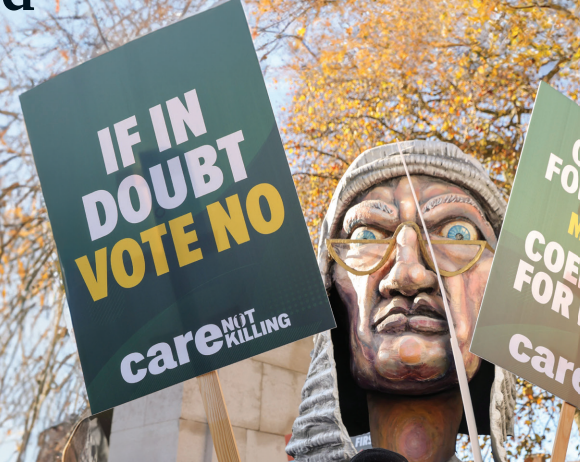
Will the latest arguments in favour of the Leadbeater Bill be as flawed as those that came before? Professor John Keown considers what lessons can be learnt from history
In his foreword to my book Euthanasia, Ethics and Public Policy (2nd edition, Cambridge University Press, 2018), Lord Judge described euthanasia and physician-assisted suicide as ‘the great moral and legal issue of our time’. Over the past 20 years several attempts have been made to legalise physician-assisted suicide in England and Wales. Bills have been modelled on the Death with Dignity Act in the US state of Oregon, which allows physician-assisted suicide for competent patients with a ‘terminal illness’. More recent Bills, like the Terminally Ill Adults (End of Life) Bill introduced by Kim Leadbeater MP, which passed its second reading last month, have added the requirement of a High Court declaration that the criteria have been satisfied.
A call for clarity
This article will, for two reasons, refer to ‘physician-assisted suicide’ not ‘assisted dying’. First, there is no crime of ‘assisting dying’ known to the law: the Suicide Act 1961 prohibits intentionally assisting or encouraging suicide. Second, ‘assisted dying’ is hopelessly vague, understood by many to include even palliative care.
In his podcast Law and Disorder on 2 March this year, Lord Falconer, the leading legal campaigner for legalisation, said: ‘Assisted dying can mean a whole range of things. It can mean taking your own life because you are terminally ill, it can mean taking your own life simply because you are suffering, or it can mean turning off the machines and not getting treatment.’ That definition is too narrow in not mentioning assisting suicide, and too broad in including turning off life-support machines and refusing treatment. Refusing a life-prolonging treatment need not involve any suicidal intent on the part of a patient, who may reject a treatment because it is either futile or too burdensome. And even if the patient’s intent were to hasten their own death, it would not follow that it was the doctor’s intention to assist the patient’s suicidal plan. The doctor may simply intend to respect the patient’s legal right to refuse treatment, a right that extends to all patients, whether ‘terminally ill’ or not. In short, lawyers, in particular, should surely employ clear and established legal terminology and eschew fuzzy euphemisms which conflate practices that are morally and legally distinct. This is especially important when analysing and discussing matters of life and death.
The Leadbeater Bill has sparked considerable debate in which eminent lawyers (both practising and academic), as well as retired judges, have participated. Whatever the fate of the Bill, it is important for lawyers and judges to be adequately briefed about the key issues it raises and its implications if enacted.
A rerun of recent history?
Ms Leadbeater has claimed that her Bill has the strictest safeguards in the world because, unlike the Oregon law, applications would require the approval not only of two doctors but also of the High Court. The Bill is essentially similar to that introduced by Baroness Meacher, debated in the House of Lords in October 2021. The Lords have repeatedly considered the issue over 30 years; criticisms of Parliament for ignoring the issue are, then, misplaced.
Although the Meacher Bill fell, the debate it generated repays study. First, debates on the Leadbeater Bill promise to be largely a rerun. Second, four very senior retired judges spoke, all in favour. Sadly, their speeches fell below the standard one would expect of such eminent jurists. When even such distinguished judges fall short, it raises doubts about the level of understanding of this ‘great legal issue’ among the judiciary and in the legal profession as a whole.
What lessons, then, can be learned (especially by MPs but also by lawyers) from the debate on the Meacher Bill? The key lesson is to avoid three questionable arguments that were made in its favour (arguments which were either supported by, or not corrected by, one or more of the four judges).
First, it was repeatedly claimed that the purpose of the Bill was to end the suffering of the ‘terminally ill’. However, the Meacher Bill did not require (nor does the Leadbeater Bill) that the patient be suffering at all, let alone suffering unbearably or beyond alleviation by palliative care.
Moreover, if the alleviation of suffering is the purpose of these Bills, why are they limited to the ‘terminally ill’? Why not include those with a chronic illness, whether physical or mental, who may face a lifetime of suffering? In short, the limitation is arbitrary and would invite legal challenge by human rights lawyers as unjustly discriminating against patients with, say, Parkinson’s. Underlining its arbitrariness, there are also questions about who would qualify as ‘terminally ill’. It would appear to include, as it does in Oregon, a person who reduces his or her life expectancy to less than six months by refusing life-prolonging treatment. A young adult with diabetes and a normal life expectancy could evidently bring themselves within the Bill simply by deciding to stop their insulin.
Another arbitrary limitation that would invite legal challenge is the exclusion of lethal injections. Why does this not unjustly discriminate against patients with total paralysis who cannot, even with assistance, lift the cocktail of lethal drugs to their lips or swallow it? The vast majority of people who access a hastened death in the Netherlands and Canada opt for an injection. What is the supposed justification for denying relief to the paralysed, or for denying the non-paralysed their autonomous preference for a quick, reliable method of departure and who do not want to risk vomiting the lethal drugs or lingering for hours?
Now to the second flaw exhibited by the Meacher debate. It was argued in favour of the Bill that when the Suicide Act 1961 decriminalised suicide it thereby created a right to suicide, and that it is illogical for the law to prohibit assisting another person to exercise this legal right. The argument is misconceived.
In debate on what would become the Suicide Act 1961, the government responded to concerns that decriminalisation might be interpreted as condonation. It emphasised that decriminalisation was not intended to condone what it called ‘self-murder’. And in R (Pretty) v DPP [2001] UKHL 61, Lord Bingham explained that suicide was decriminalised for other reasons. He observed that the policy of the law remained ‘firmly adverse’ to suicide, as the continuing prohibition on assisting or encouraging it made clear ([35]).
The third flaw was that the principled arguments for the Bill were remarkably superficial. Not only did they exaggerate respect for individual autonomy at the expense of the fundamental legal principle of the sanctity or inviolability of life, but they overlooked the disturbing implications of so doing.
One former judge went so far as to assert that there are many human rights but they can all be encapsulated in a single, overriding right: the right to personal autonomy. As the Preamble to the UN Declaration of Human Rights makes clear, however, human rights are grounded in human dignity, not autonomy. Many people lack autonomy but nevertheless have human rights. And the law rightly denies all sorts of autonomous choices, such as the choice to buy hard drugs or to drive without a seatbelt or to have a healthy limb amputated. Underlining the value of every person’s life, however sick or disabled, the law of homicide has always prohibited killing someone, or assisting their suicide, even at their fully autonomous request.
In 1994, the House of Lords Select Committee on Medical Ethics (of which Law Lord Michael Mustill was a member) published its report rejecting the arguments for legalisation. It described the law’s prohibition on intentional killing as the ‘cornerstone of law and of social relationships’ that ‘protects each one of us impartially, embodying the belief that all are equal’ (HL Paper 21-I of 1993-94, para 237). The report thereby neatly conveyed the core meaning of the ‘sanctity of life’. That principle does not, as many think, require the preservation of life at all costs. It does, however, prohibit intentional killing and intentionally assisting people to kill themselves.
Legalising euthanasia or assisting suicide would involve a radical rejection of that principle, and would replace it with the idea that it is entirely reasonable for some people (the ‘terminally ill’, for now) to think themselves ‘better off dead’ and that it is the right and duty of the state to help them end their lives. It should be clear why disability groups are so fervently opposed to legalisation: they see the writing on the wall.
Overvaluing autonomy?
Legalisation is not, fundamentally, about autonomy. Not only would assisting suicide require the involvement of others (typically state-employed physicians), but both the Meacher and the Leadbeater Bills would deny the autonomous requests of many people, like the chronically ill. If respect for autonomy really were the overriding principle, why not allow anyone to access a lethal injection, provided their request were fully autonomous?
Euthanasia on request is not the only disturbing implication of overvaluing autonomy and undervaluing human life. The vulnerability of the incompetent is another. For if all human rights can be encapsulated by autonomy, where does this leave those without autonomy, such as infants and people with profound intellectual disabilities?
A related point. If the relief of suffering is thought to justify granting the request of some autonomous patients, why deny relief to suffering patients who lack the mental capacity to request it? If the two principles of (i) respect for autonomy and (ii) the duty of beneficence are thought to justify providing someone with a lethal prescription, they also justify giving them a lethal injection, and if they justify a lethal injection for a suffering person who requests it, then beneficence alone justifies an injection for a suffering patient who cannot. As I have explained in the Cambridge Law Journal (‘The logical link between voluntary and non-voluntary euthanasia’ (CLJ Vol 81, Issue 1, March 2022, pp84-108)), the absence of autonomy does not cancel the duty of beneficence. This was recognised by the Dutch courts when in 1996, 12 years after declaring voluntary euthanasia lawful, they endorsed non-voluntary euthanasia for suffering infants.
What role for judges?
A recent and important judicial contribution to the debate has served retrospectively to identify a further flaw in the debate on the Meacher Bill: a failure to interrogate its proposed involvement of the judiciary. The involvement of the High Court is a flagship safeguard of the Leadbeater Bill, as it was of the Meacher Bill. It has, however, been torpedoed by Sir James Munby, the former president of the Family Division. His penetrating analysis, published online on 14 November by the Transparency Project (‘Assisted dying: What role for the judge? Some further thoughts’) has shown that in its proposed involvement of the judges, the Leadbeater Bill ‘falls lamentably short of providing adequate safeguards’.
Surprisingly, none of the four judges who spoke in the Meacher debate identified this lamentable shortfall. Other very senior retired judges have, however, echoed Sir James Munby’s concerns, including Lord Thomas, the former Lord Chief Justice (on the BBC Today programme, 26 November 2024). Another ‘very senior’ retired judge has been quoted (in the Financial Times for 27 November) as saying: ‘Judges are simply being recruited to add lustre to a decision made by somebody else’, and yet another as calling the protections in the Bill ‘arbitrary and defective’.
Judges and lawyers can, then, play a valuable role in the debate on physician-assisted suicide, particularly if they take care to avoid the four flaws identified in this article.
Professor John Keown DCL (Oxford) is a senior research scholar in the Kennedy Institute of Ethics at Georgetown University. His full analysis of the Meacher debate was published by Policy Exchange on 17 November 2024. Newlawjournal.co.uk
